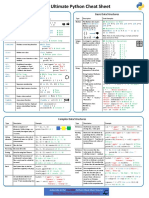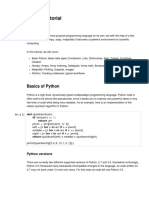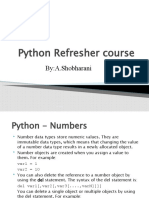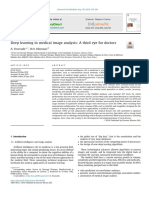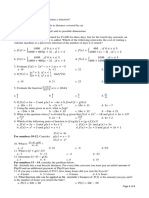0 ratings0% found this document useful (0 votes)
21 viewsPython Sheet
Uploaded by
vthieunhanCopyright
© © All Rights Reserved
We take content rights seriously. If you suspect this is your content, claim it here.
Available Formats
Download as DOCX, PDF, TXT or read online on Scribd
0 ratings0% found this document useful (0 votes)
21 viewsPython Sheet
Uploaded by
vthieunhanCopyright
© © All Rights Reserved
We take content rights seriously. If you suspect this is your content, claim it here.
Available Formats
Download as DOCX, PDF, TXT or read online on Scribd
You are on page 1/ 7
counter = counter + 10 # => >>> a = {"one": 1, "two": 2,
Slicing String 10 "three": 3}
>>> msg = "Hello, World!" >>> a["one"]
>>> print(msg[2:5]) message = "Part 1." 1
llo >>> a.keys()
Lists # => Part 1.Part 2. dict_keys(['one', 'two', 'three'])
mylist = [] message += "Part 2." >>> a.values()
mylist.append(1) dict_values([1, 2, 3])
mylist.append(2) f-Strings (Python 3.6+) >>> a.update({"four": 4})
for item in mylist: >>> website = 'Quickref.ME' >>> a.keys()
print(item) # prints out 1,2 >>> f"Hello, {website}" dict_keys(['one', 'two', 'three',
If Else "Hello, Quickref.ME" 'four'])
num = 200 >>> a['four']
if num > 0: >>> num = 10 4
print("num is greater than >>> f'{num} + 10 = {num +
0") 10}' Key: Value pair, JSON like
else: '10 + 10 = 20' object
print("num is not greater #Python Built-in Data Types Casting
than 0") Strings Integers
Loops hello = "Hello World" x = int(1) # x will be 1
for item in range(6): hello = 'Hello World' y = int(2.8) # y will be 2
if item == 3: break z = int("3") # z will be 3
print(item) Numbers
else: x = 1 # int Floats
print("Finally finished!") y = 2.8 # float x = float(1) # x will be 1.0
Functions z = 1j # complex y = float(2.8) # y will be 2.8
>>> def my_function(): z = float("3") # z will be 3.0
... print("Hello from a >>> print(type(x)) w = float("4.2") # w will be 4.2
function") <class 'int'>
... Strings
>>> my_function() Booleans x = str("s1") # x will be 's1'
Hello from a function my_bool = True y = str(2) # y will be '2'
File Handling my_bool = False z = str(3.0) # z will be '3.0'
with open("myfile.txt", "r",
encoding='utf8') as file: bool(0) # => False #Python Advanced Data Types
for line in file: bool(1) # => True Heaps
print(line) import heapq
Arithmetic Lists
result = 10 + 30 # => 40 list1 = ["apple", "banana", myList = [9, 5, 4, 1, 3, 2]
result = 40 - 10 # => 30 "cherry"] heapq.heapify(myList)
result = 50 * 5 # => 250 list2 = [True, False, False] # turn myList into a Min Heap
result = 16 / 4 # => 4.0 (Float list3 = [1, 5, 7, 9, 3] print(myList) # => [1, 3, 2,
Division) list4 = list((1, 5, 7, 9, 3)) 5, 9, 4]
result = 16 // 4 # => 4 (Integer Tuple print(myList[0]) # first value is
Division) my_tuple = (1, 2, 3) always the smallest in the heap
result = 25 % 2 # => 1 my_tuple = tuple((1, 2, 3))
result = 5 ** 3 # => 125 heapq.heappush(myList, 10) #
Similar to List but immutable insert 10
The / means quotient of x and Set x = heapq.heappop(myList) #
y, and the // means floored set1 = {"a", "b", "c"} pop and return smallest item
quotient of x and y, Plus- set2 = set(("a", "b", "c")) print(x) # => 1
Equals
counter = 0 Set of unique items/objects Negate all values to use Min
counter += 10 # => 10 Dictionary Heap as Max Heap
counter = 0 >>> empty_dict = {} myList = [9, 5, 4, 1, 3, 2]
myList = [-val for val in >>> s[::-1]
myList] # multiply by -1 to Get the character at position 1 '543215432154321543215432
negate or last 1'
heapq.heapify(myList) Looping
>>> for char in "foo": String Length
x = heapq.heappop(myList) ... print(char) >>> hello = "Hello, World!"
print(-x) # => 9 (making sure f >>> print(len(hello))
to multiply by -1 again) o 13
o
Heaps are binary trees for The len() function returns the
which every parent node has a Loop through the letters in the length of a string
value less than or equal to any word "foo" Multiple copies
of its children. Useful for Slicing string >>> s = '===+'
accessing min/max value ┌───┬───┬───┬───┬ >>> n = 8
quickly. Time complexity: ───┬───┬───┐ >>> s * n
O(n) for heapify, O(log n) |m|y|b|a|c|o|n| '===+===+===+===+===+=
push and pop. See: Heapq └───┴───┴───┴───┴ ==+===+===+'
Stacks and Queues ───┴───┴───┘
from collections import deque 0 1 2 3 4 5 6 7 Check String
-7 -6 -5 -4 -3 -2 -1 >>> s = 'spam'
q = deque() # empty >>> s in 'I saw spamalot!'
q = deque([1, 2, 3]) # with True
values >>> s = 'mybacon' >>> s not in 'I saw The Holy
>>> s[2:5] Grail!'
q.append(4) # append to 'bac' True
right side >>> s[0:2]
q.appendleft(0) # append to 'my' Concatenates
left side >>> s = 'spam'
print(q) # => deque([0, 1, 2, >>> s = 'mybacon' >>> t = 'egg'
3, 4]) >>> s[:2] >>> s + t
'my' 'spamegg'
x = q.pop() # remove & return >>> s[2:] >>> 'spam' 'egg'
from right 'bacon' 'spamegg'
y = q.popleft() # remove & >>> s[:2] + s[2:]
return from left 'mybacon' Formatting
print(x) # => 4 >>> s[:] name = "John"
print(y) # => 0 'mybacon' print("Hello, %s!" % name)
print(q) # => deque([1, 2, 3])
>>> s = 'mybacon' name = "John"
q.rotate(1) # rotate 1 step to >>> s[-5:-1] age = 23
the right 'baco' print("%s is %d years old." %
print(q) # => deque([3, 1, 2]) >>> s[2:6] (name, age))
'baco'
Deque is a double-ended queue format() Method
with O(1) time for append/pop With a stride txt1 = "My name is {fname},
operations from both sides. >>> s = '12345' * 5 I'm
Used as stacks and queues. >>> s {age}".format(fname="John",
See: Deque '123451234512345123451234 age=36)
#Python Strings 5' txt2 = "My name is {0}, I'm
Array-like >>> s[::5] {1}".format("John", 36)
>>> hello = "Hello, World" '11111' txt3 = "My name is {}, I'm
>>> print(hello[1]) >>> s[4::5] {}".format("John", 36)
e '55555'
>>> print(hello[-1]) >>> s[::-5] Input
d '55555'
>>> name = input("Enter your >>> f'{"test":*^10}' # fill >>> f'{0.25:.0%}'
name: ") center '25%'
Enter your name: Tom '***test***'
>>> name >>> f'{12345:0>10}' # fill F-Strings Sign
'Tom' with numbers >>> f'{12345:+}' # [sign]
'0000012345' (+/-)
Get input data from console '+12345'
Join f-Strings Type >>> f'{-12345:+}'
>>> "#".join(["John", "Peter", >>> f'{10:b}' # binary '-12345'
"Vicky"]) type >>> f'{-12345:+10}'
'John#Peter#Vicky' '1010' ' -12345'
>>> f'{10:o}' # octal type >>> f'{-12345:+010}'
Endswith '12' '-000012345'
>>> "Hello, >>> f'{200:x}' #
world!".endswith("!") hexadecimal type #Python Lists
True 'c8' Defining
>>> f'{200:X}' >>> li1 = []
#Python F-Strings (Since 'C8' >>> li1
Python 3.6+) >>> f'{345600000000:e}' # []
f-Strings usage scientific notation >>> li2 = [4, 5, 6]
>>> website = 'Quickref.ME' '3.456000e+11' >>> li2
>>> f"Hello, {website}" >>> f'{65:c}' # character [4, 5, 6]
"Hello, Quickref.ME" type >>> li3 = list((1, 2, 3))
'A' >>> li3
>>> num = 10 >>> f'{10:#b}' # [type] with [1, 2, 3]
>>> f'{num} + 10 = {num + notation (base) >>> li4 = list(range(1, 11))
10}' '0b1010' >>> li4
'10 + 10 = 20' >>> f'{10:#o}' [1, 2, 3, 4, 5, 6, 7, 8, 9, 10]
'0o12'
>>> f"""He said {"I'm >>> f'{10:#x}' Generate
John"}""" '0xa' >>> list(filter(lambda x : x %
"He said I'm John" 2 == 1, range(1, 20)))
F-Strings Others [1, 3, 5, 7, 9, 11, 13, 15, 17,
>>> f'5 {"{stars}"}' >>> f'{-12345:0=10}' # 19]
'5 {stars}' negative numbers
>>> f'{{5}} {"stars"}' '-000012345' >>> [x ** 2 for x in range (1,
'{5} stars' >>> f'{12345:010}' # [0] 11) if x % 2 == 1]
shortcut (no align) [1, 9, 25, 49, 81]
>>> name = 'Eric' '0000012345'
>>> age = 27 >>> f'{-12345:010}' >>> [x for x in [3, 4, 5, 6, 7] if
>>> f"""Hello! '-000012345' x > 5]
... I'm {name}. >>> import math # [6, 7]
... I'm {age}.""" [.precision]
"Hello!\n I'm Eric.\n I'm >>> math.pi >>> list(filter(lambda x: x > 5,
27." 3.141592653589793 [3, 4, 5, 6, 7]))
>>> f'{math.pi:.2f}' [6, 7]
f-Strings Fill Align '3.14'
>>> f'{"text":10}' # [width] >>> f'{1000000:,.2f}' # Append
'text ' [grouping_option] >>> li = []
>>> f'{"test":*>10}' # fill left '1,000,000.00' >>> li.append(1)
'******test' >>> f'{1000000:_.2f}' >>> li
>>> f'{"test":*<10}' # fill '1_000_000.00' [1]
right >>> f'{0.25:0%}' # >>> li.append(2)
'test******' percentage >>> li
'25.000000%' [1, 2]
>>> li.append(4) Basic
>>> li Remove num = 5
[1, 2, 4] >>> li = ['bread', 'butter', if num > 10:
>>> li.append(3) 'milk'] print("num is totally bigger
>>> li >>> li.pop() than 10.")
[1, 2, 4, 3] 'milk' elif num < 10:
>>> li print("num is smaller than
List Slicing ['bread', 'butter'] 10.")
Syntax of list slicing: >>> del li[0] else:
a_list[start:end] >>> li print("num is indeed 10.")
a_list[start:end:step] ['butter']
One line
Slicing Access >>> a = 330
>>> a = ['spam', 'egg', 'bacon', >>> li = ['a', 'b', 'c', 'd'] >>> b = 200
'tomato', 'ham', 'lobster'] >>> li[0] >>> r = "a" if a > b else "b"
>>> a[2:5] 'a' >>> print(r)
['bacon', 'tomato', 'ham'] >>> li[-1] a
>>> a[-5:-2] 'd'
['egg', 'bacon', 'tomato'] >>> li[4] else if
>>> a[1:4] Traceback (most recent call value = True
['egg', 'bacon', 'tomato'] last): if not value:
File "<stdin>", line 1, in print("Value is False")
Omitting index <module> elif value is None:
>>> a[:4] IndexError: list index out of print("Value is None")
['spam', 'egg', 'bacon', 'tomato'] range else:
>>> a[0:4] print("Value is True")
['spam', 'egg', 'bacon', 'tomato'] Concatenating
>>> a[2:] >>> odd = [1, 3, 5] #Python Loops
['bacon', 'tomato', 'ham', >>> odd.extend([9, 11, 13]) Basic
'lobster'] >>> odd primes = [2, 3, 5, 7]
>>> a[2:len(a)] [1, 3, 5, 9, 11, 13] for prime in primes:
['bacon', 'tomato', 'ham', >>> odd = [1, 3, 5] print(prime)
'lobster'] >>> odd + [9, 11, 13]
>>> a [1, 3, 5, 9, 11, 13] Prints: 2 3 5 7
['spam', 'egg', 'bacon', 'tomato', With index
'ham', 'lobster'] Sort & Reverse animals = ["dog", "cat",
>>> a[:] >>> li = [3, 1, 3, 2, 5] "mouse"]
['spam', 'egg', 'bacon', 'tomato', >>> li.sort() # enumerate() adds counter to
'ham', 'lobster'] >>> li an iterable
[1, 2, 3, 3, 5] for i, value in
With a stride >>> li.reverse() enumerate(animals):
['spam', 'egg', 'bacon', 'tomato', >>> li print(i, value)
'ham', 'lobster'] [5, 3, 3, 2, 1]
>>> a[0:6:2] Prints: 0 dog 1 cat 2 mouse
['spam', 'bacon', 'ham'] Count While
>>> a[1:6:2] >>> li = [3, 1, 3, 2, 5] x=0
['egg', 'tomato', 'lobster'] >>> li.count(3) while x < 4:
>>> a[6:0:-2] 2 print(x)
['lobster', 'tomato', 'egg'] x += 1 # Shorthand for x =
>>> a Repeating x+1
['spam', 'egg', 'bacon', 'tomato', >>> li = ["re"] * 3
'ham', 'lobster'] >>> li Prints: 0 1 2 3
>>> a[::-1] ['re', 're', 're'] Break
['lobster', 'ham', 'tomato', x=0
'bacon', 'egg', 'spam'] #Python Flow control for index in range(10):
x = index * 10 add(5, 6) # => 11 import math as m
if index == 5:
break Positional arguments # => True
print(x) def varargs(*args): math.sqrt(16) == m.sqrt(16)
return args
Prints: 0 10 20 30 40 Functions and attributes
Continue varargs(1, 2, 3) # => (1, 2, 3) import math
for index in range(3, 8): dir(math)
x = index * 10 Keyword arguments
if index == 5: def keyword_args(**kwargs): #Python File Handling
continue return kwargs Read file
print(x) Line by line
# => {"big": "foot", "loch": with open("myfile.txt") as file:
Prints: 30 40 60 70 "ness"} for line in file:
Range keyword_args(big="foot", print(line)
for i in range(4): loch="ness")
print(i) # Prints: 0 1 2 3 With line number
Returning multiple file = open('myfile.txt', 'r')
for i in range(4, 8): def swap(x, y): for i, line in enumerate(file,
print(i) # Prints: 4 5 6 7 return y, x start=1):
print("Number %s: %s" %
for i in range(4, 10, 2): x=1 (i, line))
print(i) # Prints: 4 6 8 y=2
x, y = swap(x, y) # => x = 2, y String
With zip() =1 Write a string
words = ['Mon', 'Tue', 'Wed'] contents = {"aa": 12, "bb": 21}
nums = [1, 2, 3] Default Value with open("myfile1.txt", "w+")
# Use zip to pack into a tuple def add(x, y=10): as file:
list return x + y file.write(str(contents))
for w, n in zip(words, nums):
print('%d:%s, ' %(n, w)) add(5) # => 15 Read a string
add(5, 20) # => 25 with open('myfile1.txt', "r+")
Prints: 1:Mon, 2:Tue, 3:Wed, as file:
for/else Anonymous functions contents = file.read()
nums = [60, 70, 30, 110, 90] # => True print(contents)
for n in nums: (lambda x: x > 2)(3)
if n > 100: Object
print("%d is bigger than # => 5 Write an object
100" %n) (lambda x, y: x ** 2 + y ** 2) contents = {"aa": 12, "bb": 21}
break (2, 1) with open("myfile2.txt", "w+")
else: as file:
print("Not found!") #Python Modules file.write(json.dumps(conten
Import modules ts))
Also see: Python Tips import math
#Python Functions print(math.sqrt(16)) # => 4.0 Read an object
Basic with open('myfile2.txt', "r+")
def hello_world(): From a module as file:
print('Hello, World!') from math import ceil, floor contents = json.load(file)
print(ceil(3.7)) # => 4.0 print(contents)
Return print(floor(3.7)) # => 3.0
def add(x, y): Delete a File
print("x is %s, y is %s" %(x, Import all import os
y)) from math import * os.remove("myfile.txt")
return x + y
Shorten module Check and Delete
import os class ParentClass: print("Child")
if os.path.exists("myfile.txt"): def print_test(self):
os.remove("myfile.txt") print("Parent Method") child_instance = ChildClass()
else: child_instance.print_self() #
print("The file does not class ChildClass(ParentClass): => Child
exist") def print_test(self):
print("Child Method") Inheritance
Delete Folder # Calls the parent's class Animal:
import os print_test() def __init__(self, name,
os.rmdir("myfolder") super().print_test() legs):
self.name = name
#Python Classes & Inheritance self.legs = legs
Defining >>> child_instance =
class MyNewClass: ChildClass() class Dog(Animal):
pass >>> child_instance.print_test() def sound(self):
Child Method print("Woof!")
# Class Instantiation Parent Method
my = MyNewClass() Yoki = Dog("Yoki", 4)
repr() method print(Yoki.name) # => YOKI
Constructors class Employee: print(Yoki.legs) # => 4
class Animal: def __init__(self, name): Yoki.sound() # => Woof!
def __init__(self, voice): self.name = name
self.voice = voice #Miscellaneous
def __repr__(self): Comments
cat = Animal('Meow') return self.name # This is a single line
print(cat.voice) # => Meow comments.
john = Employee('John')
dog = Animal('Woof') print(john) # => John """ Multiline strings can be
print(dog.voice) # => Woof written
User-defined exceptions using three "s, and are often
Method class CustomError(Exception): used
class Dog: pass as documentation.
"""
# Method of the class Polymorphism
def bark(self): class ParentClass: ''' Multiline strings can be
print("Ham-Ham") def print_self(self): written
print('A') using three 's, and are often
charlie = Dog() used
charlie.bark() # => "Ham- class ChildClass(ParentClass): as documentation.
Ham" def print_self(self): '''
print('B')
Class Variables Generators
class MyClass: obj_A = ParentClass() def double_numbers(iterable):
class_variable = "A class obj_B = ChildClass() for i in iterable:
variable!" yield i + i
obj_A.print_self() # => A
# => A class variable! obj_B.print_self() # => B Generators help you make lazy
print(MyClass.class_variable) code.
Overriding Generator to list
x = MyClass() class ParentClass: values = (-x for x in
def print_self(self): [1,2,3,4,5])
# => A class variable! print("Parent") gen_to_list = list(values)
print(x.class_variable)
class ChildClass(ParentClass): # => [-1, -2, -3, -4, -5]
Super() Function def print_self(self): print(gen_to_list)
Handle exceptions
try:
# Use "raise" to raise an
error
raise IndexError("This is an
index error")
except IndexError as e:
pass # Pass is just
a no-op. Usually you would do
recovery here.
except (TypeError,
NameError):
pass # Multiple
exceptions can be handled
together, if required.
else: # Optional
clause to the try/except block.
Must follow all except blocks
print("All good!") # Runs
only if the code in try raises no
exceptions
finally: # Execute
under all circumstances
print("We can clean up
resources here")
You might also like
- 1 2 3 4 5 6 7 8 9 Merged Programming PythonNo ratings yet1 2 3 4 5 6 7 8 9 Merged Programming Python9 pages
- Basic Data Structures Keywords: Types Evaluate To FalseNo ratings yetBasic Data Structures Keywords: Types Evaluate To False8 pages
- Basic Data Structures Keywords: Types Evaluate To FalseNo ratings yetBasic Data Structures Keywords: Types Evaluate To False7 pages
- Discrete Structures Lab 1 Python Basics: 1 Python Installation 2 Python TutorialNo ratings yetDiscrete Structures Lab 1 Python Basics: 1 Python Installation 2 Python Tutorial8 pages
- Python Mini-Tutorial: Invoking The InterpreterNo ratings yetPython Mini-Tutorial: Invoking The Interpreter19 pages
- Python Refresher Course: By:A.ShobharaniNo ratings yetPython Refresher Course: By:A.Shobharani43 pages
- Introduction To Quantitative Data Analysis in Python (I)No ratings yetIntroduction To Quantitative Data Analysis in Python (I)11 pages
- Lesson 4 Strings and List Processing in PythonNo ratings yetLesson 4 Strings and List Processing in Python21 pages
- python sheet (2) (AutoRecovered) (bản chính)No ratings yetpython sheet (2) (AutoRecovered) (bản chính)5 pages
- An Introduction To Python Programming LanguageNo ratings yetAn Introduction To Python Programming Language63 pages
- Data Types CE 215 Python Notes 0.0.1 DocumentationNo ratings yetData Types CE 215 Python Notes 0.0.1 Documentation10 pages
- Data Analysis With Python, String, List, Tuples, DictionaryNo ratings yetData Analysis With Python, String, List, Tuples, Dictionary12 pages
- Gravity Falls Opening Intermediate Piano Solo100% (1)Gravity Falls Opening Intermediate Piano Solo1 page
- Metropolitan Archivist Volume 21, No. 1 (Winter 2015)No ratings yetMetropolitan Archivist Volume 21, No. 1 (Winter 2015)17 pages
- Liferay EE Reference Architecture & Hardware RequirementsNo ratings yetLiferay EE Reference Architecture & Hardware Requirements16 pages
- UPTU Cut Off List 2009 Kanpur Institute of Technology, KanpurNo ratings yetUPTU Cut Off List 2009 Kanpur Institute of Technology, Kanpur2 pages
- Primefaces: Next Generation Component SuiteNo ratings yetPrimefaces: Next Generation Component Suite49 pages
- A Design Multiform Web Project With Following Menus: Home Courses, Departments, Staff 1. Home Page (Default - Aspx)No ratings yetA Design Multiform Web Project With Following Menus: Home Courses, Departments, Staff 1. Home Page (Default - Aspx)15 pages
- Roadway Cross Sections and Quantities: ObjectivesNo ratings yetRoadway Cross Sections and Quantities: Objectives58 pages
- How - Has - Technology - Affected - Day - To - Day - Life - in - The - Past - 25 - Years - Vanessa PagNo ratings yetHow - Has - Technology - Affected - Day - To - Day - Life - in - The - Past - 25 - Years - Vanessa Pag2 pages

















